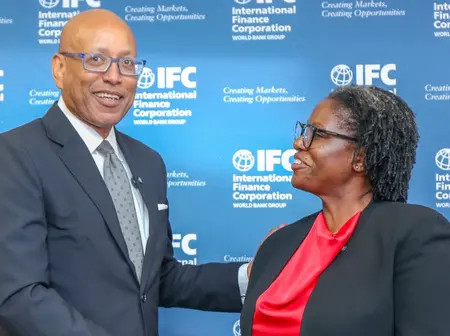Nairobi is emerging as a central hub in the International Finance Corporation’s (IFC) bold plan to mobilise Sh2.2 trillion across Africa’s private sector, aimed at creating jobs and fostering sustainable growth.
At a press roundtable ahead of the Africa Financial Summit (AFIS), IFC’s Vice President for Africa, Ethiopis Tafara, stressed the urgency of bringing together domestic and international investors to drive economic transformation.
The summit, co-hosted by IFC and Jeune Afrique Media Groupe, will take place in Casablanca, Morocco, on November 3–4.
Ethiopis Tafara highlighted the scale of Africa’s economic challenge and the urgent need to mobilise capital to match the continent’s rapidly growing workforce. He explained the overarching goal of IFC’s strategy.
“Across Africa, our priority is to unlock private capital at a scale that can truly transform economies. The need is urgent, millions of young people enter the workforce every year, and we must create more jobs faster than ever before,” Tafara stated.
He then elaborated on why traditional development financing is insufficient on its own and the role of investors in driving inclusive growth.
“That means going beyond what development institutions can finance alone and creating the right conditions for investors to back ventures that drive inclusive growth,” he added.
Finally, Tafara described the sectors and mechanisms through which IFC aims to channel investment, emphasising the ripple effects on local economies and job creation.
“By working with governments, the private sector, and partners, we can channel Africa’s own capital into high-impact sectors, from infrastructure and energy to agribusiness, tourism and manufacturing, where investments ripple through local economies, creating jobs and building a more resilient future,” he said.
Since assuming the role in May 2025, Tafara, a United States national of Ethiopian origin, has overseen IFC’s Sh2.2 trillion Africa portfolio from Nairobi, directing nearly 800 staff across the continent to expand private-sector-led development.
The IFC’s approach is guided by its 2030 strategy, which focuses on enhancing access to finance for micro, small, and medium-sized enterprises, promoting renewable energy, scaling digital connectivity, and strengthening agribusiness and food security.
The corporation is also increasing its engagement in fragile and conflict-affected regions, advising governments on climate-resilient infrastructure and creating investable opportunities to promote regional integration.
Kenya is a major priority for IFC. By August 31, 2025, the country’s portfolio had reached Sh168 billion, supporting industries from agribusiness and manufacturing to energy and digital services.
In addition, IFC has allocated Sh8.4 billion for advisory programmes targeting small businesses, manufacturing, affordable housing, and agribusiness.
Through initiatives like the World Bank Group’s AgriConnect, IFC is assisting farmers to improve market access, boost production, and increase incomes.
The M300 programme is also helping Kenya make strides toward universal renewable energy access by 2030.
With Africa’s youth population growing rapidly, the demand for employment is intense.
IFC’s leadership positions the private sector as a key driver of growth.
The Casablanca summit will focus on these priorities, setting the stage for new investment commitments that could shape the continent’s economy over the next decade.

Leave a Reply